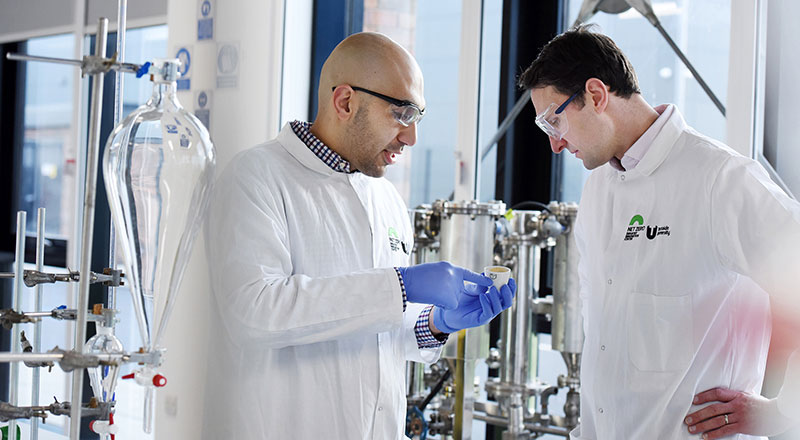
Teesside University academics are working alongside counterparts from the University of Leeds and three industry partners to investigate how residual solids left over from the fermentation process can be turned into valuable ‘char-based materials’.
The research could have far-reaching consequences for several different sectors, including pharmaceuticals, food production and biotechnology, by converting waste products destined for landfill into char-based materials which can be a valuable part of the production cycle.
By taking the solids left over from fermentation, which would ordinarily be utilised for livestock feed or go to landfill, and converting them into engineered char-based materials, the research will help make production cycles for industries much more sustainable and efficient. This would facilitate the biomanufacturing industry in its endeavour to have a net-zero environmental impact for its processes.
The two-year project, known as FermoChar, has received £870,000 funding from Innovate UK, the Biotechnology and Biological Sciences Research Council (BBSRC) and the Engineering and Physical Sciences Research Council (EPSRC), part of UK Research and Innovation (UKRI).
Also taking part in the project are Albumedix, a leading biotechnology company based in Nottingham, Biome Technologies, a Southampton-based leading bioplastics company, Three Brothers Brewing Company from Stockton-on-Tees and the Biorenewables Development Centre (BDC), a scale-up and demonstration centre based in York.
The industrial partners all use various fermentation techniques to support the manufacture of their products and will showcase how the research can be utilised across different sectors.
It is hoped that after three years, up to £10m can be generated for the project partners through efficiency saving and commercialisation of the FermoChar technology.
We are delighted to be leading this project which has the potential to deliver a significant impact on the sustainability of businesses working across multiple sectors through the reuse of waste materials.
The Teesside University team will be led by Dr Omar Aboelazayem, a senior lecturer in chemical engineering, with support from Teesside University’s Net Zero Industry Innovation Centre (NZIIC) and National Horizons Centre (NHC).
The NZIIC and NHC are, respectively, national centres of excellence for net zero technologies and bioscience.
Dr Aboelazayem said: “Teesside University is committed to using its expertise and knowledge to find innovative solutions which address the climate crisis and empower industry to achieve its net zero ambitions.
“We are delighted to be leading this project which has the potential to deliver a significant impact on the sustainability of businesses working across multiple sectors through the reuse of waste materials.”
Dr Andrew Ross, from the School of Chemical and Process Engineering at the University of Leeds, said: "This project contributes to our vision of developing sustainable processes with improved efficiency and zero waste.
"This research builds on our expertise in the valorisation of waste and forms part of our energy transition and net zero research strategy. We’re looking forward to working with our partners to transform industrial sustainability in new ways."
Dr Amy Switzer, Biotechnology Development Manager at Biome Bioplastics, added: “As a company whose bioplastics developments are all either partially or fully biobased, Biome’s utilisation of fermentation was driven to increase the biobased content of their products with a vision to promote sustainability in these processes.
“We are very excited to be part of the FermoChar project and look forward to seeing how this project can support our combined visions towards a more sustainable future.”